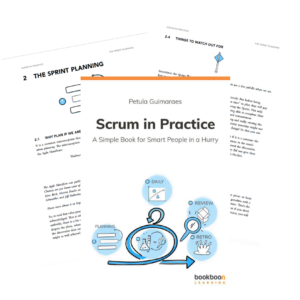
Having been one myself and having mentored and partnered with dozens of Scrum Masters in the past three years I feel this is about the time I write post about the things aspiring Scrum Masters can do to become a de facto Scrum Master. Maybe some of the things I will mention are obvious to some, but I will tell you: each one of them has a power to bring your knowledge and confidence where you need it to be to become an effective, knowledgeable Scrum Master.
I would highlight a couple of things:
- You need to understand Scrum before anything else. Then you need to understand your role as Scrum Master.
- Even though there are Scrum Master in models such as Scrumban and organizational frameworks such as SAFe which all have Scrum Masters, start with Scrum. The original.
- There is theory that you can gain on you own and there is the inescapable… practice! Devour static knowledge as you can but at some point you have to start practicing Scrum, and more important, the role of Scrum Master.
Knowledge and theory
Theory and general or specific knowledge is something you can get in many forms on your own. Here are my suggestions:
Read books, read blogs
Tons of free knowledge resides on the internet. Make the most of it! Sure thing, you started with the Scrum Guide, the source, and that is the best thing you can do. But quite honestly, if you are new, after reading the Scrum Guide you will end up with more questions than answers. That is great! Signs of a true curious mind. The next step will depend on what you want to learn more about. As an example, you might want to read and reflect deeper on a piece of the framework such as the Scrum Values or you want some quick how-to or tips for specific practices such as Scrum Masters and one on one meetings. But never stay with one single source. You want to get perspective. I’ll suggest a few:
- Scrum.org ha s a variety of articles written by the leaders and trainers as well as other seasoned Scrum Masters who just share freely.
- Zombie Scrum is a publication one every Scrum Master should know. In there, Barry and Christiaan, very known Scrum Trainers from the international community, help us understand from their practice how to make Scrum come true and live.
You are on the right track since you found this blog and now you have a couple more. 😉 Blogs are a great way to get instant knowledge in bite sizes and they usually come with points of view: people that are teaching a topic, people that are sharing their experience. Perspective helps you gain well-rounded understanding rather quickly. I could come up with a bigger list, but the actual list is less important than the fact that you are searching for the information and discovering on your own. We all have different pieces of the puzzle in our minds and you should be tailoring your knowledge for yourself. But you can find knowledge that does not depend on the internet to be with you, whenever you want it, in your e-book or paper copy. You can learn Scrum and Scrum mastery from books. Not all books, though: the right books. Too old school technology? Don’t dismiss them just yet! Because I assume you are here in the beginning of your journey as a Scrum Master, make sure the fundamentals are right. That is why I would suggest only these books at first:
Training
Get some training if you can afford it. The great thing with training is that you tap into formats designed to tell you how things work right off the bat, you have a tutor and sometimes even a team that you can ask and interact with. Trainings, no matter if they are online or offline, synchronous or asynchronous, are designed to maximize knowledge gain and to receive favorable recommendations from students. Everybody is interested in your success!
The point is: you can accelerate some learning by getting training in your organization if they are offering something, on LinkedIn learning and other basic learning portals, or in staple organizations (and way more expensive too) such as Scrum Alliance and Scrum.org.
Get certified
Part learning, part showing the world that you know Scrum and are ready to be a Scrum Master, certifications come only as third item on my list. As much as I believe the impact badges can have, don’t let that get in the way of your proper learning how to be a Scrum Master. Once you have a certification, organizations will be more open to hiring you for sure, but they will also be expecting higher standards from you. All of a sudden you are no longer perceived as student (and not given much grace or benefit of the doubt) and now you are the expert. Organizations doing so-called Agile transformations will expect that you arrive delivering both in confidence and in knowledge. The heat is on. So, I suggest that certification come a little later, to actually solidify your competence. Not to mention, some very respected certifications are impossible if you did not study hard, have a mentor and/or practice of working in Scrum, such as PSMI, II and III. That being said, some intense, in-depth, multi-day courses will give you a certification in the end, so you might end up having a 2 in 1 kind of benefit. Bear in mind they are pricey and look for respectable organizations. I honestly suggest CSM or PSM certifications as the best for Scrum Masters.
Practice
Like in any other profession, at some point you can only keep advancing if you put things in practice and continue to learn and hear from other practitioners.
Get a mentor
That is the best favor you can do to yourself. I had many mentors through my life and career, and I make a case to mentor peers as well because I truly believe in this way of sharing practical knowledge. You can only work in so many companies and be exposed to so many situations. With mentoring you gain insights that you would otherwise not be able to have. You definitely want a Scrum Master as a mentor, or an Agile Coach that have been a Scrum Master or that works a lot with Scrum. Your local Scrum or Agile community might offer seasonal programs, so that is your best bet. If you are in Montreal, QC, Canada, you should check out Agile Montreal, as they run one every quarter. If you want to get in touch with me specifically, drop me a word. If we match styles and we have time, let’s do it! I love quarterly commitments for mentoring because I think 90 days or 12 weeks (give it or take it) offer a great rhythm that is short enough to see fast results, but long enough to establish a relationship. Make a case to establish a goal for the mentoring program/commitment so that both you and your mentor stay focused and you get the most out of it. Stay curious and lead the learning. Remember, the other person can talk about a lot of things, so you should focus on what you want and need to understand Scrum and grow as a Scrum Master. Sometimes mentoring is informal. Having a coffee with someone to pick their brain or asking pointed questions every so often is really common if you have a relationship with people, even a superficial one. Tap into your connections in your Scrum community or in your organization. Are there other Scrum Masters around? Maybe an Agile Coach? Connect with them!
Join communities
Being part of communities is fun. It gives us networking for both learning and job opportunities. If you get known by your curiosity and style, even though you are a new or aspiring Scrum Master, a lot of doors can be open. Communities run communities of practice. They also offer webinars, panels, events. You become aware of the state of Scrum in your area, or globally if you are part of a broader community. Communities give you a lot of things and yet the learning is personal, because you will discover a ton by yourself. As an example, I run The LAB of all things agile. We gather online to share about specific topics and generate open source knowledge at every single session. Feel free to join! We do experiments with Scrum but also Kanban and Agile in general. I find it hard to recommend specific communities in a global world. They evolve a lot and new ones keep popping up! Several are worth a shot. Check them out on Meetup, LinkedIn, Facebook. Go to one or two events, in person or online. Get the feel for the community. You don’t’ have to be there all the time, just enough to contribute and be contributed to! And if you did not like a certain community, there are no hard feelings if you leave or never come back.
Pitch Scrum to your company
Finally, I think no one talks about this possibility enough. You could start exactly where you are, in your company, maybe even in your team. You can propose that your team experiment with Scrum. Offer to lead the way and after a certain point, you can become the team’s Scrum Master. If your team is not at freedom to change their ways of working, can you at least try a few pieces of Scrum? Maybe the daily? Maybe the habit of planning on a cadence? It will not give you the total feel or full benefits of Scrum, but it will be practical knowledge on how these tools are used in practice. Also, stay tuned with job opportunities inside your company. Are you open to change teams, even departments? Sometimes a great Agile transformation is happening just the next door from you!
In conclusion

I hope some or all this article is useful from you, from tips to links. The message is obvious but not simple: learn, practice, and get out there and be a Scrum Master.
Keep in mind this will be the beginning of a never-ending journey. Agile in general and Scrum in particular will be in continuous evolution. It is in their DNA. New understanding is generated, new techniques arrive limited only by people’s creativity. At some point you will want to master your Scrum mastery. Keep on learning. Keep on practicing.
Interested in learning more about Scrum?
If you are interested in learning more about Scrum, check out my e-book. Scrum is very simple, and you can learn how to use it in a day. If you never worked with agile before it most certainly introduces you to agility in a very practical way.

Go beyond Scrum into agile facilitation
No matter your choice of framework (and Scrum is but one of them), there is actually a rather simple way to approach how teams work in agile. They plan, execute, and the adjust work they do and how they do it in a rather unique way. And that, my friend is consistent independent of any framework used. Isn’t that cool?
If you’d like to learn how it all works and even more so, how a facilitator for agile teams (that would be YOU) positions themselves, you’ll probably like to join the upcoming cohort of the Agile Team Accelerator. That’s the place for you not only strip agile bare to your team, but also position yourself as a great agile team facilitator and get one step ahead in your personal leadership skills.



